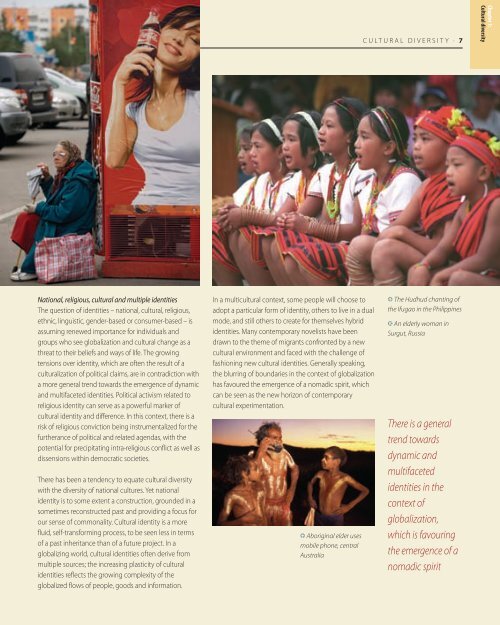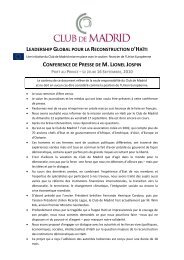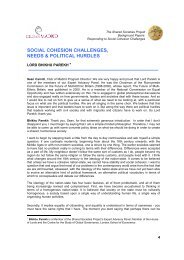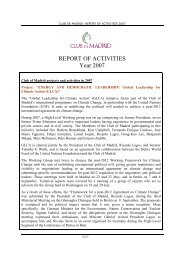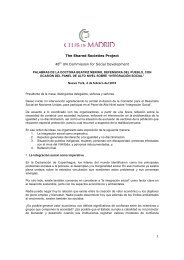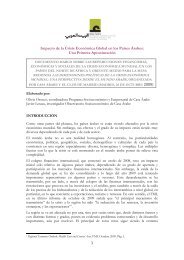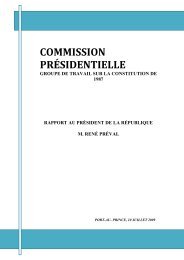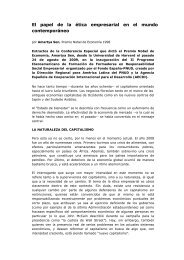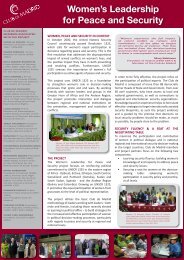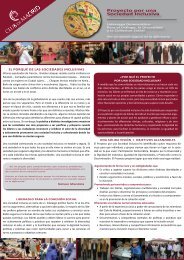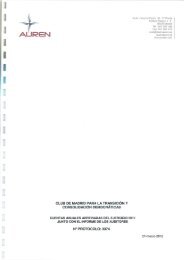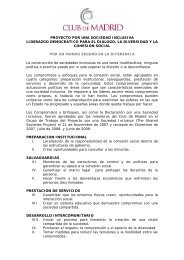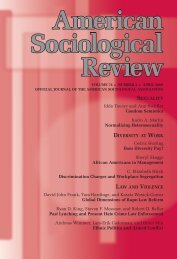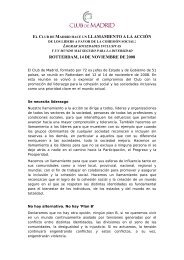Investing cultural diversity and intercultural dialogue - Business and ...
Investing cultural diversity and intercultural dialogue - Business and ...
Investing cultural diversity and intercultural dialogue - Business and ...
You also want an ePaper? Increase the reach of your titles
YUMPU automatically turns print PDFs into web optimized ePapers that Google loves.
CULTURAL DIVERSITY . 7<br />
Chapter 1:<br />
Cultural <strong>diversity</strong><br />
National, religious, <strong>cultural</strong> <strong>and</strong> multiple identities<br />
The question of identities – national, <strong>cultural</strong>, religious,<br />
ethnic, linguistic, gender-based or consumer-based – is<br />
assuming renewed importance for individuals <strong>and</strong><br />
groups who see globalization <strong>and</strong> <strong>cultural</strong> change as a<br />
threat to their beliefs <strong>and</strong> ways of life. The growing<br />
tensions over identity, which are often the result of a<br />
<strong>cultural</strong>ization of political claims, are in contradiction with<br />
a more general trend towards the emergence of dynamic<br />
<strong>and</strong> multifaceted identities. Political activism related to<br />
religious identity can serve as a powerful marker of<br />
<strong>cultural</strong> identity <strong>and</strong> difference. In this context, there is a<br />
risk of religious conviction being instrumentalized for the<br />
furtherance of political <strong>and</strong> related agendas, with the<br />
potential for precipitating intra-religious conflict as well as<br />
dissensions within democratic societies.<br />
There has been a tendency to equate <strong>cultural</strong> <strong>diversity</strong><br />
with the <strong>diversity</strong> of national cultures. Yet national<br />
identity is to some extent a construction, grounded in a<br />
sometimes reconstructed past <strong>and</strong> providing a focus for<br />
our sense of commonality. Cultural identity is a more<br />
fluid, self-transforming process, to be seen less in terms<br />
of a past inheritance than of a future project. In a<br />
globalizing world, <strong>cultural</strong> identities often derive from<br />
multiple sources; the increasing plasticity of <strong>cultural</strong><br />
identities reflects the growing complexity of the<br />
globalized flows of people, goods <strong>and</strong> information.<br />
In a multi<strong>cultural</strong> context, some people will choose to<br />
adopt a particular form of identity, others to live in a dual<br />
mode, <strong>and</strong> still others to create for themselves hybrid<br />
identities. Many contemporary novelists have been<br />
drawn to the theme of migrants confronted by a new<br />
<strong>cultural</strong> environment <strong>and</strong> faced with the challenge of<br />
fashioning new <strong>cultural</strong> identities. Generally speaking,<br />
the blurring of boundaries in the context of globalization<br />
has favoured the emergence of a nomadic spirit, which<br />
can be seen as the new horizon of contemporary<br />
<strong>cultural</strong> experimentation.<br />
L Aboriginal elder uses<br />
mobile phone, central<br />
Australia<br />
L The Hudhud chanting of<br />
the Ifugao in the Philippines<br />
l An elderly woman in<br />
Surgut, Russia<br />
There is a general<br />
trend towards<br />
dynamic <strong>and</strong><br />
multifaceted<br />
identities in the<br />
context of<br />
globalization,<br />
which is favouring<br />
the emergence of a<br />
nomadic spirit


